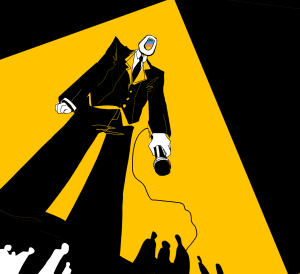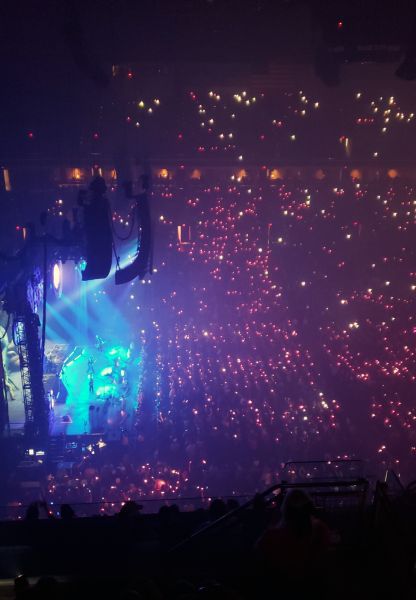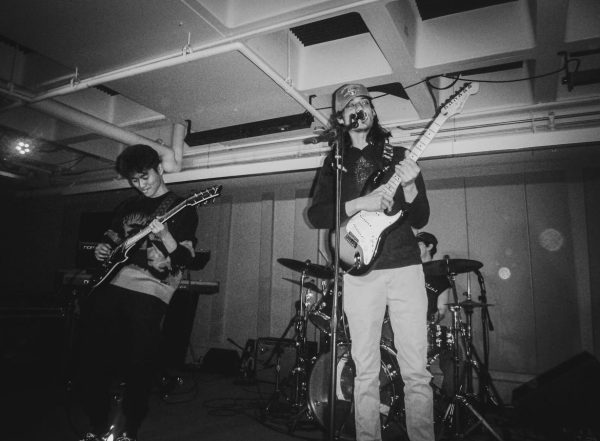Bon Iver makes a solid return, but gets stuck in the middle
August 23, 2019
Justin Vernon, or Bon Iver as he’s known when leading his main band of the same name, is a tough artist to pin down. Since releasing his first album in 2008, his style has metamorphosed considerably along with his portfolio. He is no longer just an indie-folk singer, having worked with everyone from James Blake to Kanye West.
This pattern of growth was reflected in the difference between his acclaimed 2011 self-titled album and his 2016 album “22, A Million.” While the former relied much more on layered instrumentation and folk-ish melodies, “22, A Million” explored a sound that was more electronic and filled with saxophone accompaniments. Both were ambitious and overall incredible projects, which made the buildup to this year’s release perhaps the largest he had yet encountered.
Where would he go next with his sound? What big changes would he make this time around?
With “i,i”, Bon Iver doesn’t really go anywhere. Instead, he kind of just gets stuck between his last two albums. It makes for a much less engrossing album, and while the album is not a grand disappointment, it certainly leaves something to be desired.
There are aspects of “i,i” that stand out compared to past projects. The way Vernon uses his voice has never been consistent, and at times this can be alienating. On “22, A Million,” the reliance on electronic modulation was interesting, but it also required an adjustment period.
Here though, Vernon just lets himself shine and work with his stellar instrumentation. “Faith” is a great example of his development, as he shifts in and out of his natural register and his smooth falsetto on a whim. In the past, it often felt like you would get one or the other, so this is a welcome development.
And of course, the production is still spot-on. Vernon’s ability to construct layers and immense depth to his songs is considered his calling card. Despite its instrumental density, “i,i” is crisp and clear thanks to a high attention to detail and Vernon’s careful tuning and panning. It’s absolutely gorgeous to listen to, with “Naeem” shining especially in this regard. The breakdown has Vernon’s vocals, the standard band instruments, electronic drums and a backing chorus, yet somehow makes space for all of this and doesn’t become muddy.
So again, this album was not a disappointment. But there was perhaps no risk of that in how it turned out, which is exactly why it’s still relatively underwhelming.
While there isn’t necessarily too much going on, the overall sound that Bon Iver constructed for this project is a bit of a Frankenstein’s monster. There are elements from self-titled and “22, A Million” that were mixed and combined, which didn’t make for a bad listening experience, but at times a boring or uninteresting one.
The problem with this stuck-in-the-middle sound is that the tracks begin to feel like something we’ve heard before. “iMi,” the opener after a 40-second introductory soundbite, begins with vocoded, electronic-y vocals that then make way for Vernon’s trademark self-chorusing that combines all of his registers. It’s a fusion of two vocal styles that have dominated his best work, but they aren’t nearly as strong when used this way.
Some tracks almost feel like continuations of past songs. “Holyfields,” from “i,i” and “Hinnom, TX” from Bon Iver’s self-titled may as well be consecutive tracks on an EP. They go in different directions, but their openings and backing production were similar enough that I genuinely thought it was a remastered version of a single.
I will admit that it is a bit unfair to expect a drastic, imaginative change in sound with every album from an artist. But I think that in this case, we have an odd example of an attempt to take a leap forward by taking a step back. If you are going to use what has worked in the past, you must also be careful to avoid too many redundancies. What made Bon Iver a great project was that you could always expect them to meet that benchmark.
There is a chance that my appreciation of this album just hasn’t had enough time to flourish yet. In my experience with Bon Iver’s work, it takes a bunch of listens to really understand and get into what they were going for. “22, A Million,” for example, took me over two years to warm up to. Then again, this is a much more straightforward project, and the sounds employed on “i,i” are ones I’ve already adjusted to and taken time to enjoy. There really isn’t much new musical territory to become familiar with.
So for now, I’ll take it for what it is: a solid overall project, albeit one with fewer memorable moments and less staying power than I’ve come to expect.






















